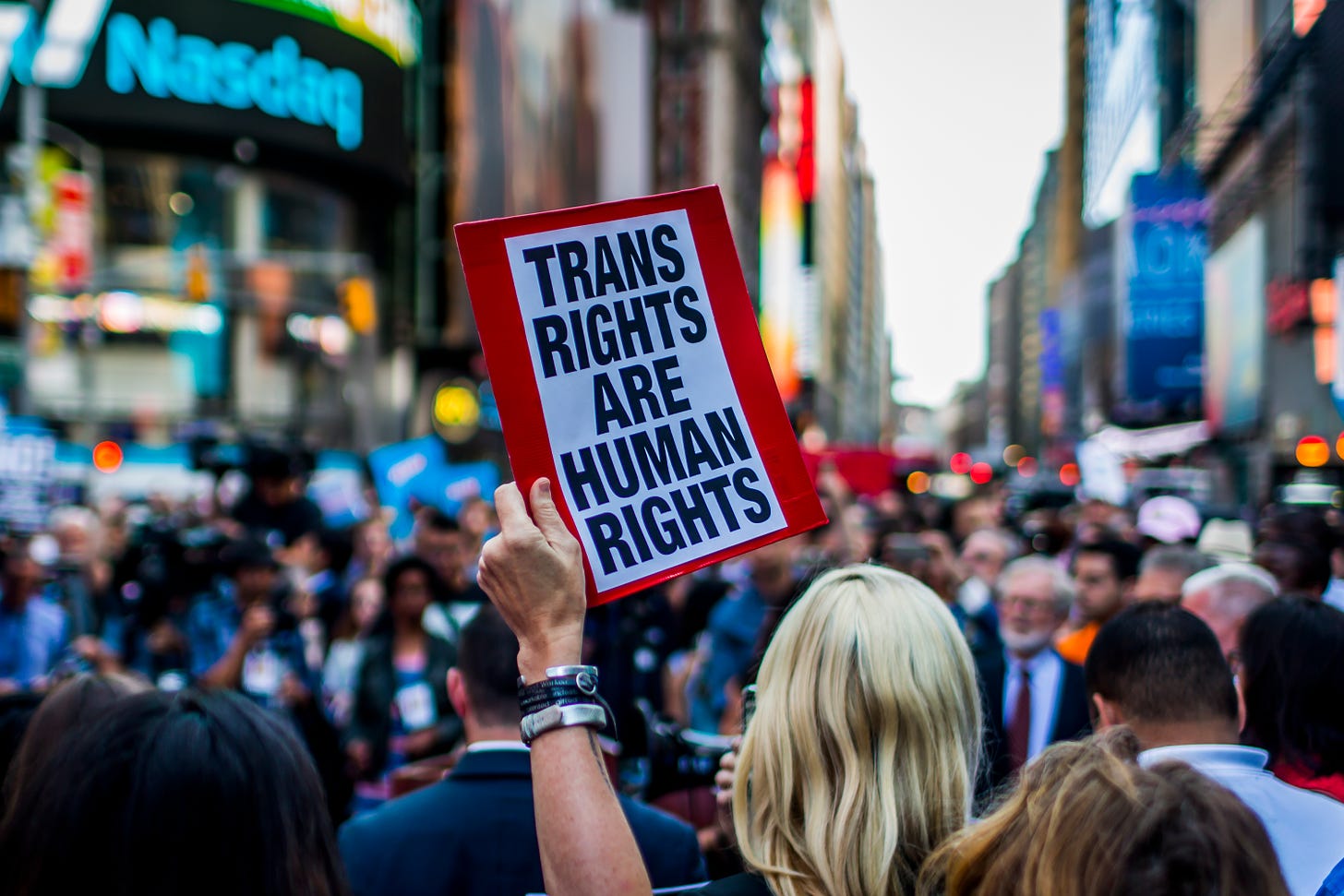In just the first few months of 2021, thirty-three states introduced more than 100 bills aimed at limiting trans people’s ability to get healthcare, participate in sports, or even use the bathroom.
This isn’t just a wave of anti-trans legislation; it’s a deluge.
On Wednesday, for example, the Florida House passed a bill that would ban trans girls from joining sports teams in high school and college, while allowing genital examinations of students suspected of being trans. On Monday, the Texas Senate debated legislation that would classify gender-affirming healthcare to trans youth as felony child abuse.
Earlier this month, Arkansas outlawed healthcare for young trans people—a decision that experts note will increase trans kids’ risk of self-harm. Similar legislation is being pushed in North Carolina, where lawmakers also want to mandate school officials report students to their parents for exhibiting any “gender nonconformity.”
It’s not a coincidence that this massive political push is happening now. For the last few years, well-known writers have been calling trans identity and care into question in the country’s most prestigious publications*—even here on Substack—giving credence to the notion that trans people’s rights, and very existence, are up for debate.
As ACLU lawyer and trans rights activist Chase Strangio put it on Twitter, “There is a really direct line from, ‘I am just raising concerns’ about health care for trans kids on the pages of the NYT/Atlantic/Economist/WaPo/NewYorker to states now ban this care.”
Republicans’ war on trans youth has been armed with the uninformed punditry of people “just asking questions.”
We’ve seen this happen before: The road to inequality has always been paved with “well-meaning” questions in the media. And like those who claim their interest in limiting trans rights is about people’s wellbeing or ‘science’, so did the bigots of yesteryear.
Before women won the right to vote, for example, the editorial board at The New York Times wrote that it didn’t “believe that the achievement of woman suffrage will increase either the happiness or the prosperity of women in America.” And in 1994, The New Republic ran a cover package on “race and IQ,” including an excerpt of The Bell Curve. (“We have been asked whether the question of racial genetic differences in intelligence should even be raised in polite society. We believe there’s no alternative.”)
From ‘don’t kids deserve a mom and a dad?’ to ‘won’t immigrants take our jobs?, America has watched over and over as people’s right to exist, live equally and be happy are treated as a matter of simple political discourse.
And just as previous ‘questions’ asked about other marginalized communities were bad faith attempts to mask bigotry, the arguments against healthcare for trans youth similarly fall apart under the barest of scrutiny.
Arkansas Rep. Robin Lundstrum, for example, has said that “when [trans kids] are under 18, they need to grow up first. That’s a big decision, there’s no going back.” (Lundstrum’s comments mirror the anti-trans writing that insists gender-affirming healthcare will permanently change children’s bodies, even though most treatment—like puberty blockers—are reversible.)
But the legislation in both Arkansas and Texas, which ban hormonal therapy or surgery on minors, make exceptions for intersex children. Intersex people—who are born with varying reproductive and sexual anatomy that doesn’t always mirror what we traditionally think of as ‘male’ or ‘female’, or whose anatomy may not ‘match’ their chromosomal makeup—are often given surgery so their genitals fit into the male/female binary.
Intersex activists have long pointed out that it’s immoral and harmful to force medically unnecessary surgery on babies who can’t consent to it—yet Republicans take no issue with this particular permanent change to children’s bodies. So long as medical treatment enforces traditional ideas about gender, they don’t have a problem.
And if the concern was truly over permanent body changes, where are the campaigns to stop teenage girls from getting nose jobs and liposuction? Where is the legislation to stop parents from circumcising their babies?
This has never been about children’s health and safety. Republicans know the statistics on self-harm and suicide among trans youth; yet they are so desperate to maintain archaic notions about gender and sex, they’d rather see kids suffer than get literal life-saving care.
There’s no such thing as good-faith debate over someone’s life and humanity, and we’ve seen the impact that “just asking questions” has had on the most vulnerable Americans for decades. So maybe, just maybe, it’s time to shut the fuck up.
*I’m not linking to these articles deliberately. If you’re interested in some trans writers who are pushing back misinformation, I’d recommend Julia Serano and Emily Gorcenski.





Thank you for the quote on life and humanity. As a teacher, I have always loved a questioning spirit, but I’ve found this disingenuous “just asking” tactic so saddening. I feel like so many foundational principles of education and journalism have been used cruelly in our current environment (perhaps they always have, but I was blind to them). I appreciate you offering the phrase.
I don’t know if I am allowed to share, but there is a podcast called Pantsuit Politics that also uses this principle to discuss current events.
I feel hopeful that this idea is gaining traction❤️. Thank you so much for your posts. In this environment where it’s hard to talk about meaningful things, they are a source of strength.
"There’s no such thing as good-faith debate over someone’s life and humanity". Thank you so much. You've expressed this so well and I've felt this in discussions with my family but haven't been able to put it into words this well! My brother is a philosopher and father a physicist and they love to "just ask questions" that never debate their own life or humanity.